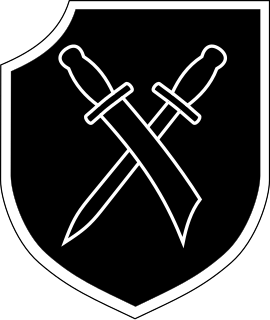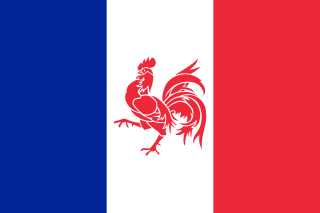
Walloons are a Romance ethnic group native to Belgium, principally its southern region of Wallonia, who speak French and Walloon. Walloons are a distinctive ethnic community within Belgium. Important historical and anthropological criteria bind Walloons to the French people.

Wallonia is a region of Belgium. As the southern portion of the country, Wallonia is primarily French-speaking, and accounts for 55% of Belgium's territory and a third of its population. The Walloon Region was not merged with the French Community of Belgium, which is the political entity responsible for matters related mainly to culture and education, because the French Community of Belgium encompasses both Wallonia and the majority French-Speaking Brussels-Capital Region.
The Liberal Reformist Party was a liberal political party active in the Walloon Region and Brussels in Belgium. The PRL grew out of the Francophone part of the unitary liberal Party for Freedom and Progress (PVV-PLP) in 1971 and merged into the Reformist Movement (RM) in 2002.

The Humanist Democratic Centre is a Christian democratic French-speaking political party in Belgium. Until 2002, the party was known as the Christian Social Party. The cdH currently participates in the Government of the Brussels-Capital Region, the Government of the French Community the Walloon Government, but no longer, following the May 2014 national elections, the Belgian federal government.

Belgium is a federal state with a multi-party political system, with numerous parties who factually have no chance of gaining power alone, and therefore must work with each other to form coalition governments.

The Parliament of Wallonia is the legislative body of Wallonia, one of the three self-governing regions of Belgium. The parliament building, the former Hospice Saint-Gilles, is situated in Namur, the capital of Wallonia, at the symbolic confluence of the Meuse and the Sambre, the two main rivers of the most inhabited parts of Wallonia, the Sillon industriel. On the other side of the Meuse, facing the Parliament, is the Élysette, the seat of the Walloon government.

The Workers' Party of Belgium is a far-left political party in Belgium that operates as a single Belgian party, in contrast to most other Belgian political parties, which are either Flemish or Francophone.
The Party for Freedom and Progress was a liberal political party in Belgium which existed from 1961 until 1992. The party was the successor of the Liberal Party, which had roots dating back to 1846. It was succeeded in Flanders by the Flemish Liberals and Democrats (VLD) and in Wallonia by the Liberal Reformist Party, Parti des Réformes et des Libertés de Wallonie and the current-day Reformist Movement. In the German-speaking Community, it still exists as the Party for Freedom and Progress.

The Walloon Legion was a collaborationist military formation recruited among French-speaking volunteers from German-occupied Belgium, notably from Brussels and Wallonia, during World War II. Created in July 1941 shortly after the German invasion of the Soviet Union, the unit was supported by the Rexist Party as a demonstration of its loyalty towards Nazi Germany. It served on the Eastern Front, initially as a unit of the Wehrmacht and, after June 1943, in the Waffen-SS. Though sustaining heavy casualties, the unit increased from battalion to brigade and eventually division-size before surrendering to the British in April 1945.
The Politics of Wallonia concern the government of Wallonia, that is the southern Region of Belgium.

Wallonie libre was a group within the Belgian Resistance during the German occupation of Belgium during World War II which subsequently became a small political party. Part of the Walloon Movement politically, its ideology became increasingly radical in the post-war period.
The Walloon Rally is a regionalist political party in Belgium, active in Wallonia since 1968. The party favoured federalism and since 1985 independence.

The Rassemblement Wallonie France is a small political party in Belgium. It is active in Wallonia and the Brussels-Capital Region. In Brussels it is known as the Rassemblement Bruxelles France or RBF. Its aim is the secession of Wallonia, Brussels and the six Flemish municipalities with language facilities for French-speakers around Brussels from Belgium and to unite them with France.
The Walloon Movement is an umbrella term for all Belgian political movements that either assert the existence of a Walloon identity and of Wallonia and/or defend French culture and language within Belgium, either within the framework of the 1830 Deal or either defending the linguistic rights of French-speakers. The movement began as a defence of the primacy of French but later gained political and socio-economic objectives. In French, the terms wallingantisme and wallingants are also used to describe, sometimes pejoratively, the movement and its activists.
The Walloon Movement traces its ancestry to 1856 when literary and folkloric movements based around the Society of Walloon language and literature began forming. Despite the formation of the Society of Walloon Literature, it was not until around 1880 that a "Walloon and French-speaking defense movement" appeared, following the linguistic laws of the 1870s. The movement asserted the existence of Wallonia and a Walloon identity while maintaining the defense of the French language.

Rattachism or Reunionism (Réunionisme) is a minor political ideology which calls for the French-speaking Belgium or Wallonia to secede from the state of Belgium and become part of France. Brussels, which is majority French-speaking but enclave in Flanders, may be included within this ideology as may the six Flemish municipalities with language facilities for French-speakers. It can be considered a French-speaking equivalent of Orangism or Grootneerlandisme in Flanders.
The history of Wallonia, from prehistoric times to the present day, is that of a territory which, since 1970, has approximately coincided with the territory of Wallonia, a federated component of Belgium, which also includes the smaller German-speaking Community of Belgium. Wallonia is the name colloquially given to the Walloon Region. The French word Wallonie comes from the term Wallon, itself coming from Walh. Walh is a very old Germanic word used to refer to a speaker of Celtic or Latin.

The Manifesto for Walloon Culture, was published in Liège on 15 September 1983 and signed by seventy-five "key figures in artistic, journalistic and university circles" of Wallonia.

The Reichsgau Wallonia was a short-lived Reichsgau of Nazi Germany established in 1944. It encompassed present-day Wallonia in its old provincial borders, excluding Comines-Warneton but including Voeren. Eupen-Malmedy and Moresnet were also omitted, both of which had already been incorporated into Germany after its victory in the Battle of France in 1940.

The Walloon Workers' Party was a political party in Belgium.














